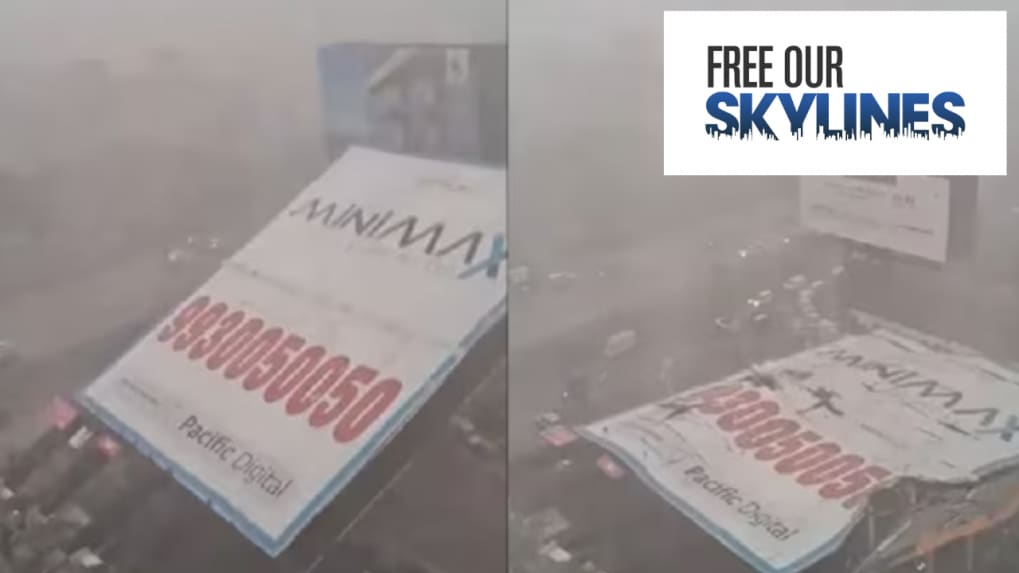Mumbai billboard collapse: Scope of Disaster Management Act in providing accountability and relief
The Disaster Management Act gives victims and families of victims in incidents like the May 13 hoarding collapse in Mumbai not only legal options but also a host of compensations.
ADVERTISEMENT
The Mumbai hoarding collapse incident on Monday, May 13, has raised concerns about OOH (out of home) advertising standards and how it impacts pedestrian and citizen safety. An important piece of this conversation is the Disaster Management Act and how it empowers those affected in incidents such as the Ghatkopar hoarding collapse that killed 14 and injured over 100 people.
“The Disaster Management Act (DMA), 2005 is a key piece of legislation which mandates setting up mechanisms for disaster response, including providing relief to victims including but not limited to temporary accommodation, medical aid, and financial assistance. While the hoarding collapse might not be a typical natural disaster, the immediate response and relief measures outlined in the DMA can still be triggered,” said Sandeep Bajaj, Advocate, Supreme Court of India.
The Act doesn’t stop here though. Victims and their families can also seek compensation through civil suits against parties responsible.
Read More: Mumbai “illegal hoarding” collapse; BMC to take legal action against ad agencies
Alay Razvi, partner at boutique law firm Accord Juris LLP said, “Victims and their families have legal rights under existing laws and regulations. They can seek compensation by filing civil suits against the parties responsible for the hoarding collapse, such as the owner of the structure, the municipal authorities responsible for enforcing building regulations, and any other relevant entities involved in its construction or maintenance.”
Additionally, criminal charges may be pursued if negligence or other unlawful acts contributed to the collapse.
“In the case of the Mumbai incident, the Act would be invoked to coordinate rescue operations, provide medical assistance, and ensure rehabilitation of the affected individuals,” he added.
Not many know that it is not always the company but also people in positions of power who may have had a role to play in the cause of a disaster can be held responsible.
Paritosh Dhawan, Principal and Founder, Dhawan and Co breaks down the Act further.
According to him, under Section 58 of the Disaster Management Act, 2005, if a company or body commits an offense, both the individuals in charge of the company's affairs and the company itself are held accountable. This provision deems those individuals responsible for the conduct of the company's business at the time of the offense to be guilty and subject to legal action.
Consequently, it ensures that not only the company but also those individuals in positions of authority are held liable for any contraventions of the Act.
Read More: Eknath Shinde directs BMC to audit and remove dangerous hoardings in Mumbai
“Therefore, in cases such as the recent Mumbai hoarding collapse, where a company's actions or oversights result in harm, Section 58 facilitates the pursuit of justice by enabling authorities to proceed against both the company and the responsible individuals,” Dhawan explained.
“The aggrieved should also knock the doors of the BMC (Bombay Municipal Corporation) and other authorities and ask the due diligence and checks done by them before installation of the said hoarding,” he added.
Soon after the incident on Monday, BMC issued a statement saying Ego Media, the agency owning the billboard, did not have the permit from the corporation. An FIR against Bhavesh Bhide, the owner of the agency was also registered the same day.
#FreeOurSkylines - Fight against illegal ad hoardings: A terrible tragedy struck on May 13 after a 100-foot-tall illegal billboard fell at a petrol pump in Ghatkopar during dust storms and unseasonal rains in Mumbai. The killer hoarding caused the deaths of over a dozen people and injured many others. The catastrophic incident outraged citizens who have been dealing with the menace of illegal ad hoardings. The people don't want just answers but solutions, as they turn to civic authorities, advertising agencies, industry bodies, brand marketers, and media owners, to take responsibility and fight against the menace of illegal advertising hoardings. So speak up and join the #FreeOurSkylines movement. Write to us at Storyboard18@nw18.com with your concerns and views, and let’s make our cities safer together.


